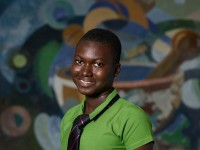
According to the 2015 UN Millennium Development Goals Report, around 33 million children of primary school age and 22 million adolescents in sub-Saharan Africa are out of school. 55% of those children are girls.
Camfed, an international non-profit organisation, is addressing this problem in an innovative way. Camfed has developed a new alert technology within its programme and financial database to help ensure that girls stay in school.
If a girl is absent, teachers can report it immediately using cheap mobile phones or tablets. Then local community activists can find out where she is and why she’s not in school. The OECD has acknowledged Camfed’s community-based education model as a model of best practice in terms of taking innovation to scale.
Since 1993, Camfed education programs in Zimbabwe, Zambia, Ghana, Tanzania and Malawi have directly supported over 1,419,000 students to attend primary and secondary school. Often in rural Africa, boys are sent to school, while girls are kept at home to help with household chores. There are social and cultural attitudes to overcome as well as early pregnancy, early marriage, and sexual violence.
Camfed’s long-term approach covers more than school fees, uniforms, shoes, books and sanitary protection. They support young graduates with additional training so that they can become economically independent. The flow on effects of educating girls includes empowering them so that they can choose when to marry and when to have children.
Speaking to the Financial Times, Daniel Probert, head of IT innovation at Camfed, says that, “The data are the child’s safety net. We know which school and class they are in, who their parents are, where their families live. This information is continually updated so that we can be dynamic in our response to each child’s needs.”
One beneficiary of Camfed’s scholarship program is 17 year old Sheila, from Ghana. The youngest of four, she worked hard to get enough money to pay for her school fees. Sheila sold water in the market, washed clothes for other people, ran errands, and often went to school hungry. Things changed when she was selected to receive a full Camfed scholarship funded by The MasterCard Foundation Scholars Program, which is supporting the secondary and tertiary education of 6,000 young women across Ghana over the next decade.
Sheila says, “Now, I only have to worry about my studies because I don’t have to go through all the stress I used to go through before about being able to pay my fees. I want to be a medical doctor in the future because in my community we don’t have enough doctors, which causes so many lives to be lost. I want to be able to save the lives of people.”
According to Rebecca Winthrop, the director of the Center for Universal Education at the Brookings Institution, it’s not just about getting kids to stay in school. In an interview with Africa Renewal Online, she says, “We know that if girls are building skills and knowledge, families are more likely to keep them in school.”



















That initiative has come at the right time when African countries are urgently looking for the right approach towards harnessing population divident. Uganda in particular has launched Vision 2040 targeting to be a middle income economy. However, keeping girls in school remains a serious challenge since the dropout rate is so high. We need to link up with the implementers of that program to save our society.